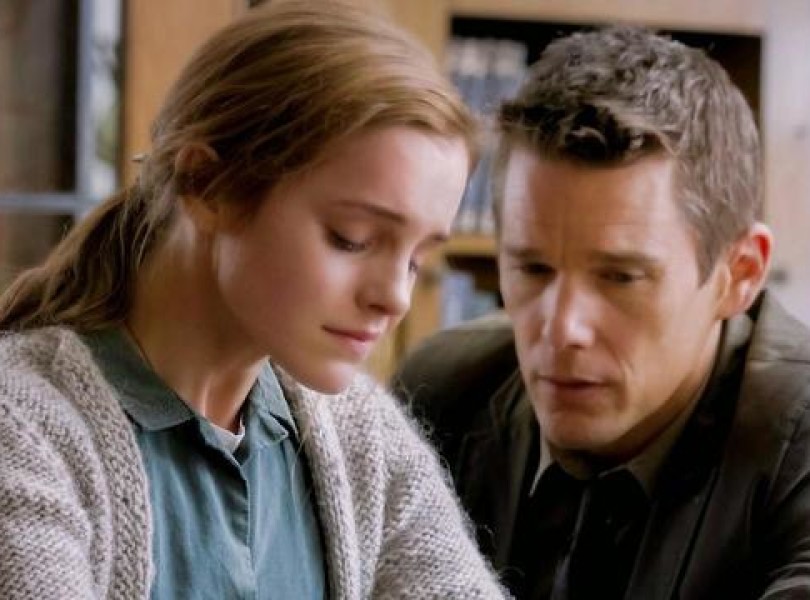Ethan Hawke and Emma Watson are bedeviled by an unsurprising story in this cult thriller.
By Josh Lasser
Everything starts out well enough in the new Ethan Hawke-Emma Watson thriller, Regression. Or, it starts out well enough for the audience. The characters have a whole heap of problems. By the time the credits role at the end of the movie, some characters will be better off and others worse, but that audience for whom things started so well will only wind up disappointed.
The film takes place in 1990, a time when, the beginning of the film tells the audience, satanic fears were sweeping the nation. It is “inspired” by real events. Hawke plays the lead character, police detective Bruce Kenner. Recently left by his wife, Kenner finds himself on a case involving a local family, the Grays. The father, John (David Dencik), has been accused by the daughter, Angela (Watson), of molesting her. Rather than denying the crime, John says that he simply can’t remember. It’s impossible that it happened but he’s also certain that it’s true; Angela doesn’t lie.
Soon, Angela’s story expands – there was more than one person involved, they were dressed like people in a satanic cult, weird rituals took place. The entire small city in Minnesota in which they live becomes caught up in Angela’s satanic cult story and while there is no physical proof of anything, the tales the police are told by many people corroborate Angela’s account.
We want to hear it.
Kenner and a partner he has brought in on the case, Professor Kenneth Raines (David Thewlis), continue to investigate and search for the truth. Eventually, Kenner starts to think the cult may be coming after him, but he remains determined to figure out what’s going on.
Written and directed by Alejandro Amenábar, Regression tries to be many things at once. It is a mystery, with Kenner trying to figure out the truth behind all the rumors and search for evidence that John did this horrible thing. It is a thriller, with people in dark cloaks, tales of sacrificing babies, and an entire town scared of the devil. It is a tale of psychology, with Professor Raines performing regression therapy on witnesses and suspects, attempting to help Kenner come up with solid answer.
What Regression isn’t but maybe needs to be is a tale of characters. Hawke’s Kenner is written as an absolutely generic obsessive cop, the kind who has separated from his wife because of his work and where he never even finished unpacking the boxes after moving. He is the most fully-realized character and he only achieves that status because of what the audience brings to him having seen a myriad of versions of the character before. Watson’s Angela, despite being a central figure, is only in a handful of scenes and even if her story grows more involved over time, the truth at its core is clear very early on. She is supposed to be a mystery, an enigma, but never rises to that level.
To be clear, this doesn’t feel like either Watson or Hawke’s fault. They are just not given all that much to do – Watson isn’t around long enough and Hawke’s character never takes his obsession to new and different places. They are written as sketches of characters with a few basic bullet points rather than full human beings.

Despite things being relatively clear pretty early on, Regression just keeps chugging along for an hour and 45 minutes. It goes down a track everyone in the audience sees coming, without adding any new stops along the way.
The amazing thing about Regression isn’t so much that it’s bad, it’s that it’s mundane. By the time the closing credits start rolling, there is the sense that the movie is only half-finished – surely now that it’s taken care of the obvious stuff that everyone knew was going to happen the movie will now begin in earnest. But, no, there is no second film that begins after the credits end despite however much one gets the sense that there ought to be.
At the start of Regression, there are any number of paths the film could go down, there are any number of versions of the story it could tell. At every point where Amenábar has a choice to make about the direction of the story, rather than opting to go give the audience any new, different, or interesting path, the movie takes the most well-worn and obvious of routes. It does this to the extent that the biggest surprise the film has to offer is that there is no surprise whatsoever.



